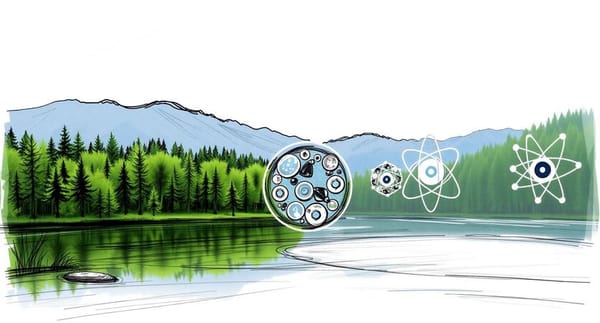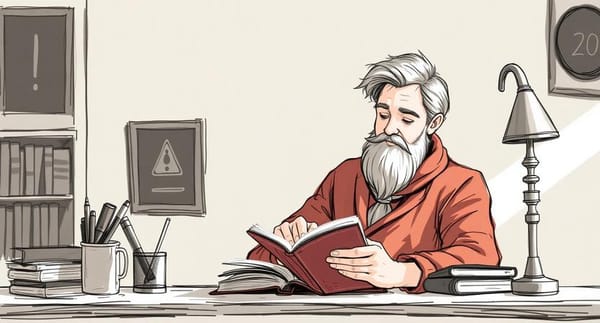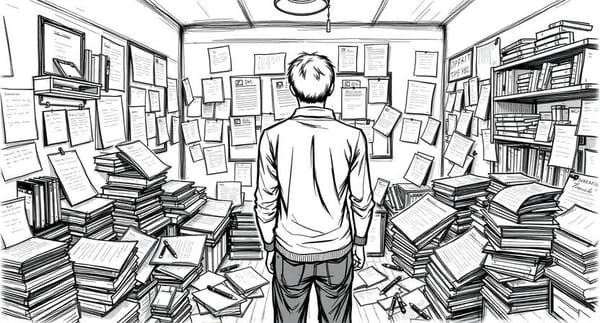Systemic collapse
Sending off the indictment was like firing a flare; the last option to signal my distress. All I could do was wait and hope for help. But help would not arrive. Over the next year, I would only grow ever more jaded by the state of modern academia.

At first, my submission was rejected. The document was considered too long to be forwarded to the commission. If I wanted to push on, I needed to summarise everything in only a few pages. Ironically, I had anticipated busy minds and designed the indictment for fast processing. Its sections took on different perspectives, of varying granularity—and already included the requested information.
It contained a one-page synopsis as well as a four-page abstract that described the chronology of events. For closer examination, it contained a full account of my experience (12 pages), and an expansive 50-page dissection of the affected data. That part details not only how and why things fall apart, but highlights the original authors’ many contradictory statements that support my position, and unravels the root cause of it all. For an overview of infractions, I included bullet lists (both for situational and subject-matter narratives) as well as an account of breaches already sorted by the agency’s own classification. I even discussed the situation’s ramifications in multiple dimensions, and—of course—attached evidence. Whatever they needed, it was all right there. And it was all for naught.
The only way to get things moving was by fully restructuring the document, with the issues isolated and listed by type of infraction. A difficult undertaking, considering most of the individual points were tightly interconnected and often violated good scientific practice on multiple levels at once. This new structure would oversimplify things and sever critical ties. I did my best to whittle the indictment down to 20 pages, but it lost a lot and was decidedly less comprehensible (in my opinion). Where the original indictment included the relevant evidence, explained and detailed, this revision was reduced to dry statements that only referenced the crucial information. But okay. That was the agency’s preference, and I still painted a devastating picture.
The commission replied after a few weeks, requesting me to restructure the “extensive” information once again, this time distilled to one page, with the main accusations sorted by gravity and relevance. But how to decide? Is it worse to show different results for the same experiment, or to repeat one measurement for different investigations? To claim a mathematical impossibility, or to omit essentially all data? To trim results favourably? To forego controls? To ignore the results that raise serious questions? Is it more worrisome that a PhD thesis devoid of data was ever handed in, or that it was waved through by all supervisors?
I thus addressed a letter directly to the commission, making it clear that the situation could not be reduced to their desired format. It was too restricting for the magnitude. This was about a decade of research, several publications, and multiple institutes. Finally, I got through. The commission initiated a “detailed investigation” and I was soon asked for permission to contact my former supervisor.
It was confusing, though. I didn’t know which accusations were being followed, or what information would be forwarded. By this time, I had handed over a lot of files and there were many unknowns. How could I protect myself? What outcome expectation was realistic? Was there any possible benefit for me?
Additionally, the process of investigation had me increasingly nervous. I had, on multiple occasions, pointed out that some raw data was—to the best of my knowledge—still saved to a measurement device; data that proved my claims directly. But the agency never followed up, saying it was “not a judicial organ”. Furthermore, the commission’s modus operandi was unsettling: They were going to investigate solely one point of criticism and then only proceed with a full investigation if it proved warranted. As I would come to learn, that was not exactly true—and my worry was entirely justified.
It was a rough period. The entire process seemed to put me at great disadvantage, and there was nothing to be gained from any of this, even if I proved right. Still, I needed to know who was right, and so gave my permission. This time, it took a few months before I heard back. Even before I opened the message, I knew the investigation’s outcome. It was only two months later; there was no way the commission had fully reviewed my criticism, let alone contacted my former supervisor and awaited their reply.
In their confusing and vexing report, the commission claims to have extensively discussed all accusations, but found only one relevant (thereby essentially discounting their own guidelines). The selected point was then forwarded to the accused, who supposedly proved that all of it was nothing more than a simple error. Therefore, scientific misconduct could not be verified and the matter was closed. Even though all concerned publications are freely available, I was denied access to this evidence. I never got the clarity I needed.
To this day, I don’t know what information was forwarded, or why the sole selected point was only partially examined. I don’t know why my supervisor’s tacit concession didn’t cause further scrutiny. I don’t know why so much of my criticism was ignored despite solid evidence.
What I do know is that my university is named after an eminent scientist, and the commission misspelt the name in their statement. And I do know that none of its members were experts in the relevant field.




